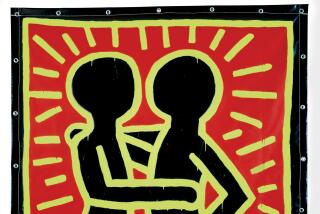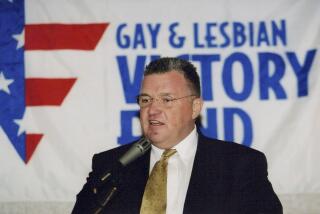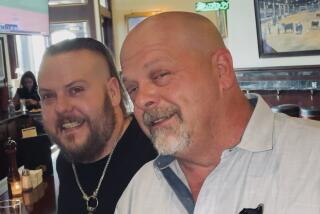Dushan ‘Dude’ Angius, AIDS crusader whose story helped inspire ‘Philadelphia,’ dies at 88
At a time when the nation still spoke in hushed tones about AIDS, Dushan Angius tossed such worries aside and stood up before his fellow Rotarians and told them that his son had the disease.
Angius wasn’t looking for sympathy, nor was he trying to jar the conservative gathering in a Bay Area suburb. He was just looking to awaken others who might help him fight a medical threat he knew loomed on the horizon.
Within weeks, another member revealed that he had tested positive for the disease. And then a fellow Rotarian who was a club favorite and played Santa Claus at the group’s Christmas celebration announced that he too had AIDS, contracted from a blood transfusion following heart surgery.
It was the start of a small town’s resolve to override fear and prejudice and push forcefully and openly for a cure.
The Rotary Club’s effort triggered a national movement in the service organization and ultimately spawned an award-winning documentary — “The Los Altos Story” — that sought to reshape the hardened attitudes in America about a disease that many believed would never touch them or their families.
“When a son tells you he has AIDS, all you hear is ‘Gee, Dad, I’m going to die.’ There’s no way I could let it go that way,” Angius told the Associated Press in 1990.
Angius, who died Jan. 7 in Walnut Creek at 88, was a lifelong educator who was a coach, principal and school superintendent in Los Altos and Susanville. A former student who played basketball for Angius at Los Altos High later urged his old coach to join the local Rotary Club chapter.
In 1989, as president of the chapter, Angius told fellow members that his son Steve had informed him he had AIDS and was coming home from New York City, essentially to die. It was a powerful moment that spurred others to step forward and some to set aside their parochial beliefs that AIDS was assigned to some far-away gay community and had no bearing on their lives.
With Angius leading the way, the club formed the Los Altos Rotary AIDS Project and decided to make its own AIDS documentary, with the goal of distributing copies to all 24,000 chapters worldwide.
Originally it was going to use Angius’ personal story as its moral core, but as others came forward, the 30-minute film evolved into a story of activism in a cozy, well-to-do Silicon Valley town. The film was helped along by producer Greg Hoblit and written and directed by former NBC correspondent Robin Young.
On the first day of shooting, crews filmed Steve Angius asking his family to take him to the hospital. He died the next day.
“Grown men cry when they watch this thing,” Dick Hasenpflug, a former chairman of the Rotary AIDS Project, said in a 1990 interview.
“We believe strongly that the AIDS project transcends politics,” Hasenpflug said. “The political part of it is how people catch it, and in my opinion, how people catch it is irrelevant once they catch it.”
Born Nov. 4, 1928 in Los Angeles, Angius graduated from Stanford University and lived the majority of his life in the Bay Area. He was known to family, friends and students simply as “Dude.”
After the release of “The Los Altos Story,” Angius served on President Clinton’s first AIDS Task Force and he and his family are cited in the credits with providing inspiration for “Philadelphia,” the 1993 movie starring Tom Hanks that was among the first mainstream productions to deal directly with AIDS and homophobia.
“The Los Altos Story” was ultimately distributed to Rotary Clubs across the U.S. and Canada, translated into six language and was shown on both cable and network television. It won both a Peabody and an ACE award.
The Los Altos Rotary AIDS Project continues its work.
Angius is survived by his wife Barbara, sons Dan, Mike and Bob, daughter Toni, eight grandchildren and six great-grandchildren.
More to Read
Start your day right
Sign up for Essential California for the L.A. Times biggest news, features and recommendations in your inbox six days a week.
You may occasionally receive promotional content from the Los Angeles Times.







